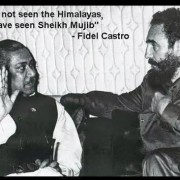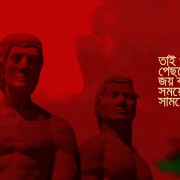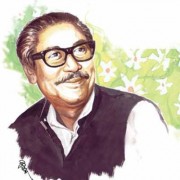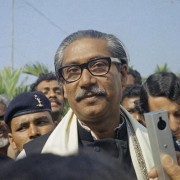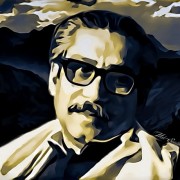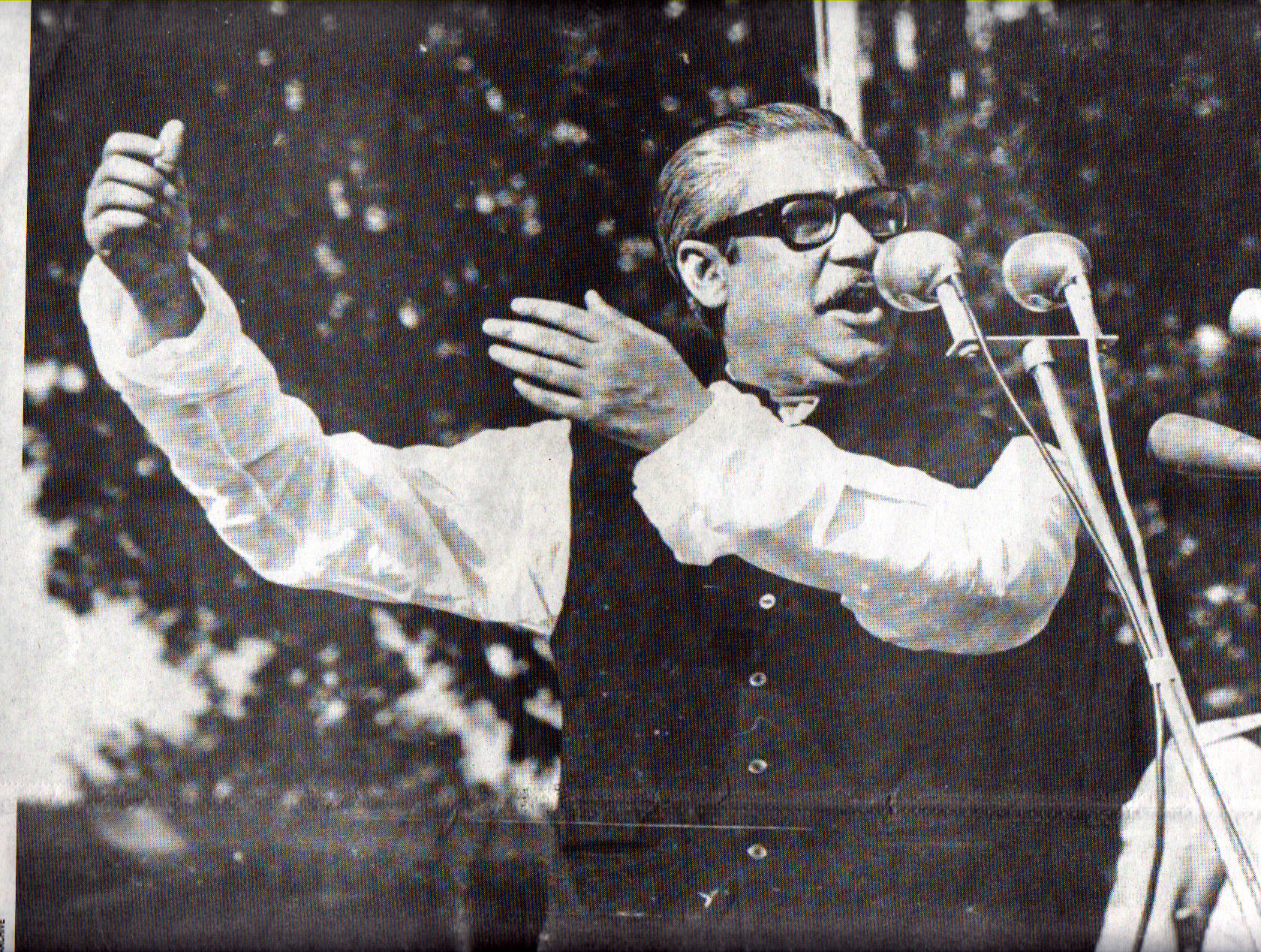 The assassins of Sheikh Mujibur Rahman have been brought to justice 23 years after he was murdered and his government was overthrown in a military coup. A historic wrong has thus been set right.
The assassins of Sheikh Mujibur Rahman have been brought to justice 23 years after he was murdered and his government was overthrown in a military coup. A historic wrong has thus been set right.
NOVEMBER 8, 1998 could well be a turning point in Bangladesh’s history. On that day, Kazi Gulam Rasul, a District and Sessions Court judge of Dhaka, sentenced to death by firing squad in public 15 former Army officers, the “self-confessed killers” of Sheikh Mujibur Rahman, 23 years after the country’s founding father was assassinated in a military coup that overthrew Bangladesh’s first Government. Mujibur Rahman was brutally murdered along with 26 others, including his wife, three sons (one of them was just 10 years old), two daughters-in-law, brother, close relatives, political associates and security men in a pre-dawn attack on August 15, 1975.
The historic verdict, which was delivered after 17 months of hearings, came at the end of an agonising trial (see chronology). The “Bangabandhu murder case” – as it is called – was filed in October 1996, more than 21 years after the assassination took place and four months after the Awami League Government led by Sheikh Hasina, one of Mujibur Rahman’s two surviving daughters, assumed office.
 Following the award of the death sentence to 15 former Army officers who were found guilty of the assassination of Sheikh Mujibur Rahman on August 15, 1975, a march in Dhaka on November 8 remembering the Father of the Nation.
Following the award of the death sentence to 15 former Army officers who were found guilty of the assassination of Sheikh Mujibur Rahman on August 15, 1975, a march in Dhaka on November 8 remembering the Father of the Nation.
The people of Bangladesh never saw the assassination of Mujibur Rahman, popularly known as “Bangabandhu” (Friend of Bengal), as an isolated incident. Mujibur Rahman was assassinated three and a half years after he led East Pakistan to independence from West Pakistan through a bloody war of liberation, which was in effect a firm rejection of the “Two-Nation Theory” of Mohammad Ali Jinnah (this theory led to the Partition of India in 1947). The act of breaking away from West Pakistan was viewed as a political and social revolution that aimed at opposing the dominant role of the military in politics and at discarding the politics of communalism. In the popular perception, Mujibur Rahman thus represented a secular and progressive Bangladesh. For pro-liberation Bangladesh, the demand to bring to trial his assassins was therefore a moral compulsion.
Secular and progressive Bangladeshis never came to terms with the 1975 massacre although the assassins and their accomplices justified their action on the grounds that Mujibur Rahman had assumed absolute power under the one-party (Bangladesh Krishak Sramik Awami League) system of governance he enforced and suppressed his political opponents. Pro-liberation Bangladesh continued to view the assassination and the coup as a plot hatched to steer the newly-formed country away from its avowed path of socialism, democracy, nationalism and secularism. This belief was lent credence to by successive military and quasi-military governments which dropped secularism from the set of state principles and substituted Bengali nationalism, the guiding spirit of the country’s war of liberation, with the new-found “Bangladeshi-nationalism”, which is based on religion.
 Mujibur Rahman’s daughter and Prime Minister Sheikh Hasina weeps while answering newspersons’ questions on the historic verdict.
Mujibur Rahman’s daughter and Prime Minister Sheikh Hasina weeps while answering newspersons’ questions on the historic verdict.
The shame that accompanied the killings was deepened by the proclamation in 1975 of the Indemnity Ordinance by the military government of Khandaker Mostaque Ahmed, who appointed himself President of the country following Mujibur Rahman’s assassination. The infamous Ordinance was incorporated in the Constitution by President Gen. Ziaur Rahman. The Ordinance granted indemnity from prosecution to those who plotted for and participated in the bloody political changeover.
However, the Shiekh Hasina Government, after it assumed office in June 1996, sought the opinion of a panel of judges and legal experts and cleared the hurdles in the way of prosecution of the plotters. In October 1996, cases were filed against 19 persons in connection with the assassination. All but one of the accused were former military personnel.
 At the District and Sessions Court, Dhaka, retired Lieutenant-Colonels Mahiuddin Ahmed and Shahriar Rashid Khan, two of those who were sentenced to death.
At the District and Sessions Court, Dhaka, retired Lieutenant-Colonels Mahiuddin Ahmed and Shahriar Rashid Khan, two of those who were sentenced to death.
THE former Army officers who have been sentenced to death are Lt. Col. Syed Farooq Rehman, Lt. Col. Sultan Shahriar Rashid Khan, Lt. Col. Mahiuddin Ahmed, Lt.Col. Khandaker Abdur Rashid, Maj. Bazlul Huda, Lt. Col. Shariful Huq Dalim, Major Sharful Hussain, Lt. Col. A.M. Rashed Chowdhury, Lt. Col. Mahiuddin Ahmed (Lancer), Lt. Col. Noor Chowdhury, Lt. Col. Abdul Aziz Pasha, Capt. Mohammad Kismet Hashem, Capt. Najmul Hossain Ansar, Capt. Abdul Majed and Risalder Molemuddin alias Moslehmuddin. The first three were arrested from Dhaka in August 1996. The others were handed down the sentences after being tried in absentia.
Of the army officers who were tried and sentenced in absentia Maj. Bazlul Huda’s return to the country was ensured by the Government in a dramatic way. All the others are believed to be hiding in various countries, including the United States, Canada, Libya and certain European and Asian countries. Maj. Huda and Lt. Col. Khandaker Abdur Rashid, two key persons behind the coup of 1975, floated the Freedom Party along with Lt. Col. Syed Farooq Rehman in the 1980s after returning from their self-imposed exile. Rashid and Huda fled the country again as soon as Shiekh Hasina was sworn in as the Prime Minister in 1996. Within hours of the pronouncement of the death sentence, Huda was brought to Bangladesh by special aircraft from Bangkok, where he was facing a jail term on charges of shop-lifting. Lt. Col. Syed Farooq Rehman, who returned to Bangladesh 10 years after the assassination, even contested the presidential election against Gen. H.M. Ershad in the late 1980s. (Frontline, in its issue dated November 1-14, 1986, published an interview with him.)
 Lt. Col. Syed Farooq Rehman (right), who was found guilty, and Abdul Wahab Joarder, who was acquitted.
Lt. Col. Syed Farooq Rehman (right), who was found guilty, and Abdul Wahab Joarder, who was acquitted.
Meanwhile, the Sheikh Hasina Government has initiated talks with the countries in which the assassins are believed to be staying to have them deported to Bangladesh. The Bangladesh police has also sought the help of the Interpol to facilitate the return of the assassins.
THE trial and the judgment are seen as constituting a major blow to the trend of frequent military take-overs in Bangladesh. The successful conclusion of the trail has also strengthened the country’s quest for stabililty for its democracy.
 In Dhaka on November 12, a march by activists of the Bangladesh Nationalist Party to protest against the death of seven BNP workers in violence during a three-day, countrywide hartal called by the Opposition party. The BNP and its allies have not publicly supported the leaders of the 1975 coup, but Sheikh Hasina has said that “their aim is to protect the killers”.
In Dhaka on November 12, a march by activists of the Bangladesh Nationalist Party to protest against the death of seven BNP workers in violence during a three-day, countrywide hartal called by the Opposition party. The BNP and its allies have not publicly supported the leaders of the 1975 coup, but Sheikh Hasina has said that “their aim is to protect the killers”.
While handing down the verdict, Kazi Golam Rasul acquitted four of the accused, giving them the benefit of the doubt. They included one of the prime accused, Taherussin Thakur, former Information Minister and the lone civilian among the accused. The Government is, however, likely to appeal against this acquittal in a higher court. (Another civilian who was among the accused, Zobaida Rashid, wife of Lt. Col. Khandaker Abdur Rashid, had been acquitted of the charges against her by the Supreme Court at an early stage of the case.)
KAZI GOLAM RASUL ensured that the proceedings in the case progressed according to due process of law. For its part, the Government scrupulously adhered to due process of law and provided the accused, including the absconders, opportunities to defend themselves. The Government did this despite the fact that in a case like this it could have formed a special tribunal, which would have tried and sentenced the accused in a much shorter span of time. In fact, the Government even appointed lawyers for the accused persons who were absconding.
The defence lawyers challenged the legality of the trial by the District and Sessions Court on the grounds that such a trial had been barred by the Indemnity Ordinance of 1975. They also challenged the moral and legal propriety of senior advocate Sirajul Haq appearing as Chief Public Prosecutor in the case, for he was an Awami League member of Parliament when Mujibur Rahman was assassinated. Defence lawyers also raised objections relating to the location of the court which was situated in an old building adjacent to the Dhaka Central Jail. Only after the Supreme Court overruled the objections did the trial court begin the hearings.
 Shah Moazzem Hossain, leader of a faction of the Jatiya Party, and K.M. Obaidur Rahman, MP, and Nurul Islam Manzoor, both belonging to the BNP, who were arrested in connection with the murder on November 3, 1975 of four leaders of the liberation struggle. All three were at one time influential leaders of the Awami League.
Shah Moazzem Hossain, leader of a faction of the Jatiya Party, and K.M. Obaidur Rahman, MP, and Nurul Islam Manzoor, both belonging to the BNP, who were arrested in connection with the murder on November 3, 1975 of four leaders of the liberation struggle. All three were at one time influential leaders of the Awami League.
The Judge gave the verdict after 148 days of hearings and cross-examination. Passing the sentence under Section 302/34 of the Bangladesh Penal Code, the Judge said: “It has been proved beyond reasonable doubt that a total of 15 accused killed the then President Bangabandhu, along with his family members, relatives and some others at the 677 Dhanmondi residence of Bangabandhu in furtherance of a pre-planned conspiracy at about 5 a.m. on August 15, 1975.” The judgment said: “After the incident, some of the accused also boasted, identifying themselves as ‘self-confessed killers’ at home and abroad.” “The incident,” it added, “was not only brutal, but also marked the ruthless shooting of two newly married women and a 10-year-old child.”
The judgment was welcomed by almost all sections of Bangladeshi society. Among the leaders to welcome it were Ershad, the leader of the country’s third biggest party, the Jatiya Party, and Jatiya Samajtantrik Dal (JSD) leaders A.S.M. Abdur Rob and Hasanul Huq Inu. Pro-liberation Bangladesh, which had been demanding for a long time that the Bangabandhu’s assassins be punished for their crime, rejoiced at the judgment. Most of the Opposition leaders described it as a landmark judgment since they believed that the sentence passed on the assassins meant a victory not merely for the Awami League, but for the entire pro-liberation Bangladesh.
The leading newspapers of the country described the verdict as a “historic” one. In fact, almost all of them began their reports on the judgment in a similar way: “Twenty-three years, two months and three weeks after the fateful early hours of August 15, 1975, the historic judgment came….”






Six rulers who were in power in Bangladesh following the assassination of Sheikh Mujibur Rahman, including (from top row, left) Khandaker Mostaque Ahmed, Gen. Ziaur Rahman, Justice Abdus Sattar, Gen. H.M. Ershad, and Begum Khaleda Zia, shielded the killers or failed to investigate the crime. (Not pictured here is Chief Justice A.M. Sayem, who succeeded Mostaque Ahmed as President.) It was during the tenure of Sheikh Hasina (bottom row, far right) that the trial began, nearly 22 years after the assassination.
However, the judgment shocked a section of political opinion in Bangladesh. The main Opposition party, the Bangladesh Nationalist Party (BNP) founded by Gen. Ziaur Rahman and now led by his wife and former Prime Minister Begum Khaleda Zia, and its ally, the fundamentalist Jamaat-e-Islami, observed a three-day, countrywide hartal from November 9, a day after the judgment was passed. Although the BNP and its allies have not publicly supported the coup leaders, their stand on the bloody political changeover of 1975 is no secret. Obviously they believe that the judgment could jeopardise their political position since they subscribe to an ideology that is similar to that of the coup leaders. In the past it was their leaders who patronised the coup leaders by giving them diplomatic positions abroad. They are thus trying desperately to bring down the Sheikh Hasina Government.
An alarm has been sounded in the BNP’s headquarters also because of the Government’s decision to try persons accused of the murder of four national leaders three months after Mujibur Rahman’s assassination. These leaders led Bangladesh through the period of the war in 1971 and ran the provisional ‘Mujibnagar Government’ in exile when Mujibur Rahman was arrested in Pakistan. They were Vice-President Syed Nazrul Islam, Prime Minister Tajuddin Ahmed, Finance Minister Capt. Mansoor Ali and Relief and Rehabilitation Minister Kamruzzaman; they were killed in Dhaka Central Jail on November 3, 1975, allegedly by the same group of Army officers who assassinated Mujibur Rahman. Three Opposition leaders have been charge-sheeted in this case: members of Parliament K.M. Obaidur Rahman and Nurul Islam Manzoor, both of the BNP, and Shah Moazzem Hossain, co-chairman of a faction of the Jatiya Party. All the three were at one time influential leaders of the Awami League.
The Government has also announced that it will hold trials in cases related to all political killings in order to “establish the rule of law and to halt the politics of killing” which the 28-year-old country has witnessed for years. The proposed trials include those relating to the assassination of Gen. Ziaur Rahman, who was gunned down by a group of Army officers in Chittagong in 1981. No civilian trial was held in the case, although 13 Army officers who fought in the freedom movement were sentenced to death by a military tribunal. There are also indications that the Government plans to hold trials in the case relating to the mysterious killing of Gen. Manzoor, the former General Officer Commanding of Chittagong who allegedly led a rebellion against Ziaur Rahman and was shot dead without trial. Ershad, the then Army chief, is the main accused in the case, which was initiated during Begum Khaleda Zia’s tenure as Prime Minister. The Sheikh Hasina Government’s proposal to hold a trial in the killing of Col. Abu Taher, a freedom fighter who was hanged by the Ziaur Rahman Government, has been received well by freedom fighters and leading politicians of the Left.
THE political motives behind the protests organised by the BNP and its allies are understandable, for unless they build up a strong anti-Government agitation the Sheikh Hasina Government will go ahead with the trials and the trials may turn out to be embarrassing for them politically. Indications are that the protests are likely to intensify in the near future.
The ruling party believes that the protests are part of a “conspiracy” hatched by Khaleda Zia’s party and her “fundamentalist allies” in order to “protect the killers of Bangabandhu” through destabilisation tactics.
 In December 1971, Lt. Gen. A.A.K. Niazi (right), chief of Pakistan’s Eastern Command, and Lt. Gen. J.S. Arora of the Indian Army sign the document relating to the declaration of unconditional surrender of Pakistan’s troops in East Pakistan.
In December 1971, Lt. Gen. A.A.K. Niazi (right), chief of Pakistan’s Eastern Command, and Lt. Gen. J.S. Arora of the Indian Army sign the document relating to the declaration of unconditional surrender of Pakistan’s troops in East Pakistan.
The Shiekh Hasina Government’s five-year tenure will end in two years. There are doubts whether the sentence on the assassins would be executed by that time since the judgment will be appealed against in the higher court. Whatever the ultimate outcome, the trail of Mujibur Rahman’s killers and the death sentence awarded to them by a court of law is a victory for pro-liberation Bangladesh.
Soon after the judgment was passed, Sheikh Hasina went to her parents’ house in Dhanmondi, where the massacre took place. The house has been converted into a museum, where visitors can see evidence of the massacre, including traces of Mujibur Rahman’s blood. Speaking to newspersons, Sheikh Hasina said: “The day the verdict is executed, the people of Bangladesh will be free from the curse.” In a voice choked with emotion she expressed her gratitude to all those who protested against the injustice and those who sacrificed their lives demanding a trial.
Author : HAROON HABIB
in Dhaka


